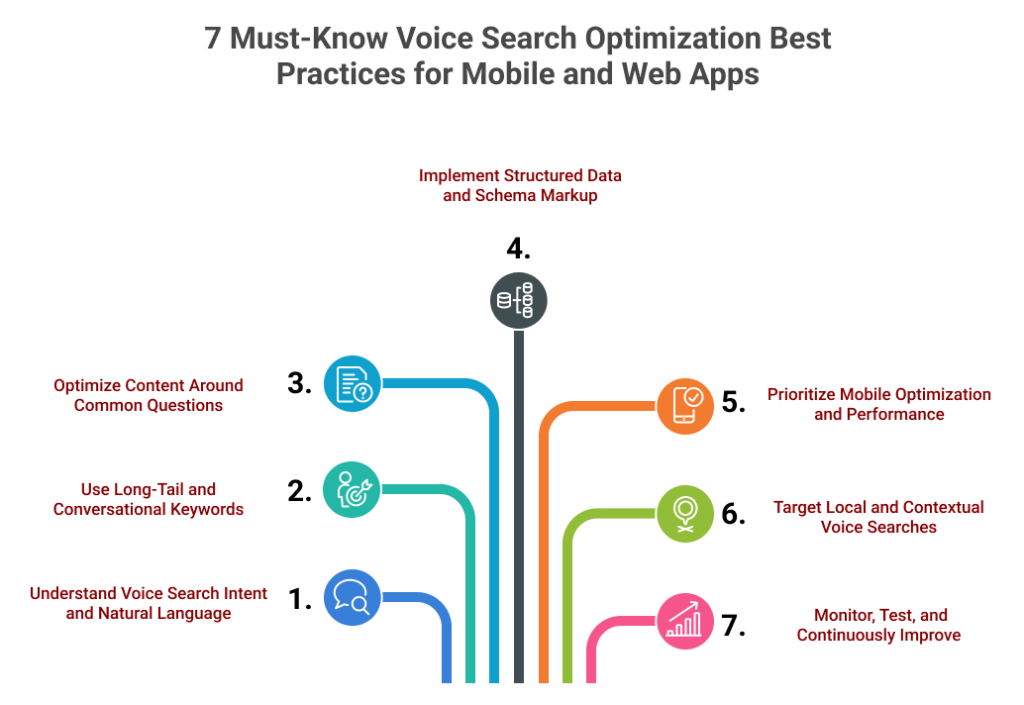Introduction
- What is voice search optimization?
- Why it’s critical for businesses in 2025
- The 7 must-know voice search optimization best practices to help your business succeed with voice SEO
- How companies can use voice search as a strategic growth tool
Whether you’re a business owner, product leader, or digital strategist, voice search optimization isn’t just a nice-to-have, it’s how your users are searching, and how your competitors are winning.
What is Voice Search Optimization?
- Your app or website is easily understood by voice assistants like Google Assistant, Siri, and Alexa
- Your content can answer real user questions clearly and directly
- You’re using long-tail, natural language keywords that reflect how users actually speak
At SculptSoft, we see voice search as more than just a feature, it’s a strategic layer of the user experience that helps businesses deliver smarter, faster, and more intuitive interactions.
Why Voice Search Optimization Matters for Businesses in 2025
1. Voice Queries Reveal High-Intent Users
2. Most Voice Searches Happen on Mobile
3. Voice Search Increases Discoverability in Competitive Markets
4. Enhances In-App Experience Through Natural Interaction
5. Local and Service-Based Searches Are Largely Voice-Driven
6. Builds a Future-Ready Competitive Advantage
Adopting voice-first development practices shows your business understands where users are headed – boosting brand authority, user satisfaction, and long-term scalability.
7 Must-Know Voice Search Optimization Best Practices for Mobile and Web Apps

1. Understand Voice Search Intent and Natural Language
2. Use Long-Tail and Conversational Keywords
3. Optimize Content Around Common Questions
4. Implement Structured Data and Schema Markup
5. Prioritize Mobile Optimization and Performance
6. Target Local and Contextual Voice Searches
7. Monitor, Test, and Continuously Improve
These voice search optimization best practices don’t just improve how your app ranks, they enhance how your users engage, convert, and return.
Bringing It All Together with the Right Development Approach
Final Thoughts
As user behavior shifts toward voice-first interactions, optimizing your mobile and web apps for voice search is no longer optional, it’s a strategic necessity. From understanding natural language patterns to building platforms that are fast, flexible, and user-centered, every detail plays a role in how your business gets discovered and engaged in 2025.
The right development approach makes all the difference. Whether you’re planning to build a new platform or enhance an existing one, investing in a well-structured, future-ready application sets the foundation for long-term success. As voice search and AI-driven interfaces continue to grow, businesses that begin optimizing their mobile and web apps today will be in a stronger position to lead the digital experience of tomorrow.
Have a project in mind? Contact us to explore how SculptSoft can help bring your next mobile or web app to life.
Frequently Asked Questions
What is voice search optimization?
Voice search optimization (VSO) is the process of tailoring your website or mobile app to effectively respond to spoken queries made through voice assistants like Google Assistant, Siri, or Alexa. It involves using natural language, question-based keywords, and structured data to help your content appear in voice search results improving visibility, engagement, and discoverability across voice-enabled devices.
Why is voice search optimization important for SEO in 2025?
Voice search is transforming how users find information especially on mobile. As more people use voice commands to search, websites optimized for voice have a better chance of ranking in featured snippets, attracting high-intent traffic, and staying competitive in voice-enabled search results.
How do I optimize my website for voice search?
To optimize your website for voice search:
- Use long-tail, conversational keywords
- Answer frequently asked questions clearly and concisely
- Add FAQ schema and structured data
- Ensure fast mobile performance
- Focus on local SEO for “near me” queries
These strategies help your content rank better for spoken queries.
Is voice search different from traditional search?
Yes. Voice search is typically more conversational and longer than text-based search. Users often ask full questions aloud, so optimizing content to match spoken queries (instead of typed keywords) is essential to rank in voice-driven results.
Which types of businesses benefit most from voice search optimization?
Businesses that rely on local visibility, service-based queries, or content discovery benefit the most such as local service providers, e-commerce stores, SaaS platforms, healthcare, and real estate. Voice optimization helps these businesses capture high-intent users actively looking for solutions or providers.